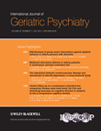The effects of a nursing guideline on depression in psychogeriatric nursing home residents with dementia
Research Coordinator.
Professor in Nursing at the end of life.
Abstract
Objective
To study the effects of introducing a nursing guideline on depression in residents with dementia of psychogeriatric nursing home wards.
Methods
A multi-center controlled clinical trial with randomization at ward level was used to study the effects of the guideline introduction. Nursing teams were trained in applying the guideline to their own residents diagnosed with depression in dementia. Key elements of the nursing guideline are increasing individualized pleasant activities and decreasing unpleasant events. Participating residents were 97 residents diagnosed with dementia and comorbid depression, from 18 psychogeriatric nursing home wards, in 9 Dutch nursing homes. Measurements took place at pre-test, post-test and follow-up. Primary outcome was severity of depression measured with the MDS/RAI-Depression Rating Scale (DRS) and the Cornell Scale for Depression in Dementia. Secondary outcome is mood as measured by the FACE-observation scale.
Results
Compliance with the nursing guideline was moderate. Despite this, residents on the experimental wards showed a significant reduction in depression on the DRS. With the Cornell scale a reduction of depression was found as well, although not significantly different from that in the control group. No effects on observed mood were found.
Conclusion
This study shows significant reductions in depression severity by introducing a nursing guideline on psychogeriatric nursing home wards. Better compliance with the guideline could probably enlarge the effects. Some ways to achieve enhanced compliance are: (1) additionally train non-certified nurse assistants, and (2) emphasize necessary conditions for successful introduction of the guideline to nursing team managers. Copyright © 2010 John Wiley & Sons, Ltd.




